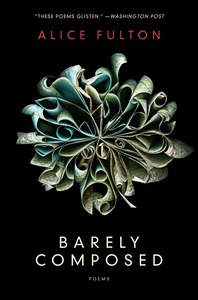Alice Fulton’s Barely Composed

[This post has been updated. 4/18/2018]
Where to begin? Well, after getting a comment (below) from Alice Fulton, I revisited my other books by her. And she’s right! So she didn’t give me a business card that said “word mechanic,” but she read a poem about some other poet giving her a business card.
Even so, reading her latest book, Barely Composed (Norton, 2015), I can still her crawling under the lines to tinker with the parts. She is a wordsmith of the first order.
Fulton has always struck me as unconcerned with making sense. (Though see the comments.) I think this is because I have always been overly concerned with making sense, with being linear, with telling a story. Reading her work challenges me to be more playful, to take more seriously poetry’s higher calling to something beyond mere “sense.”
And Fulton does play! She plays with clichés and colloquialisms, tosses in science and politics, and somehow gets away with it all (masterfully). Although these poems predate the 2016 presidential election, their refusal to be linear seems to me strangely fitting for our times, and prescient. (As in “Peroral”: “It’s like a prison that makes itself at home in you, / like so not worth it, so not mattering, and so / fair King of Not, you self-release, secede, sowing / misgivings as you go.”) When her dying mother shows up in the book, even sideways references signaled to me the ways in which the poems offer an alternative way to understand what cannot be understood. These poems, in particular, depict for me a world that has been shaken and shattered and glued back together–maybe–but by a person unable to remember where everything goes.
Once you give up trying to make sense of the poems, the lines begin to sizzle and hum. My initial feeling was that I would not be able to read Barely Composed straight through; then I realized that reading it in one sitting was a very good way to read it–total immersion was what finally helped me drop through my resistance and into the sheer admiration that I felt for Fulton from the very first time I encountered her. The final poem, “End Fetish–An Index of Last Lines,” underscored and clarified for me how Fulton’s individual lines pop with emotion and nerve, and maybe some incantational magic as well.
So here is a poem for you to try out for yourself–a sonnet located near the end of the book:
There Are a Few Things I Need to Get
to sleep. A dreamboat of submersible iron,
a sea that rocks, narcotic clock. I need
our feelings to glide and turn in unison, silversides.
Snow gristle, stenciled trees, an ice-breaker
escort–who needs them? Spring’s your favorite season.
You like its green lotions. Touched by its soft tissues,
you don’t miss the jilted winter. Still,
the figure eight motion of lacing a skate
is soothing. A forever effect. Like everything
you do. I’ve plunged past my crush depth. I can tell
by the way paint flashes and my protective
rubber mask melts on my face. It’s not your doing
I like, it’s you. You and your green emollients. Now let us chill.
After we’re exchanted, we come all so still.
In 2016 Fulton was the Roethke reader at the University of Washington. She signed Barely Composed for me, and wrote: “With thanks for your generous spirit tonight, and gratitude for your presence across the centuries.”
You don’t always have to know what a thing means to appreciate it. And I do.

